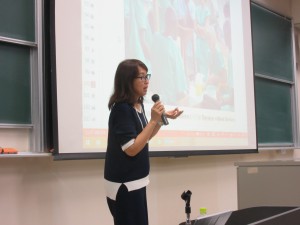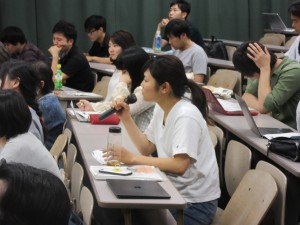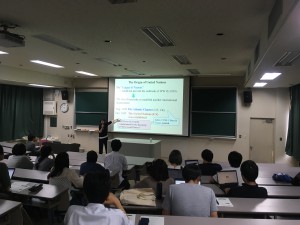Governmental Seminar
Speaker: Hiromi Fujishige (Associate Professor, Aoyama Gakuin University)
Title: The Evolution and Challenges for United Nations Peace Operations and Japan’s International Peace Cooperation
Date&Time: 16 May (Thu.) 2019, 15:00-16:30
Venue: Lecture room1, Oe campus, Kumamoto University
Abstract:
The UN Peace Operations was originally established in 1948 to maintain a ceasefire mostly in inter-state wars (e.g. the Indo-Pakistan Wars). It was basically a solider who monitored ceasefire but he/she basically acted unarmed and did not fight themselves. What they could do was only to maintain “Negative Peace,” that is, the just absence of physical violence.
The end of Cold War completely changed the situation. Their chief responsibility is to assist reconstruction of “fragile states,” that is, states troubled by weak governments without will and/or ability to govern their own countries. In the global era, the problems of fragile states often pose trans-border concerns, such as civil wars, terrorism, refugees and drug smuggling. It could also raise humanitarian disasters as seen in Genocide of Rwanda in 1994. With these changes, the recent operations are mostly tasked to rehabilitate fragile states, especially ones after internal conflicts.
Rebuilding statehood requires multiple and comprehensive efforts, combining military and civilian efforts. Today they are more generally called “Peace Operations.” Peacekeeping is still an important part of it, but it also includes peacebuilding, i.e. civilian-led activities to rebuild post-conflict states. Peacebuilding could cover various activities, such as disarmament of ex-combats, election, political reform, and reconciliation among people. Integrating peacekeeping and peacebuilding efforts, Peace Operations today aims at archiving not only “Negative Peace” but also “Positive Peace,” removing deep-rooted caused of state instability.
Since 1992, Japan has taken part in peace operations, mainly dispatching engineering units of Self-Defense Forces. They are composed of military personnel but their main duty is to reconstruct infrastructure, such as paving roads. They were dispatched, for example, to Cambodia, East Timor, Haiti and elsewhere. Since their withdrawal from South Sudan in 2017, however, no engineers have been deployed due to the rising security concerns for the recent peace operations. For this reason, the Government of Japan has recently shifted its gear to provide trainings to the other troop contributing countries. So far, the Japanese Government has mostly focused on training of engineering works, but it is now trying to expand its scope to include, for example, communication technologies and medical care.



PDF: 20190516gs
※ Business/Governmental seminars are for person who related at Kumamoto university.
If you are not parties and would like to participate, please contact following adress.
higo-program[atmark]jimu.kumamoto-u.ac.jp
please revise [atmark] to half width@ when you send email.





